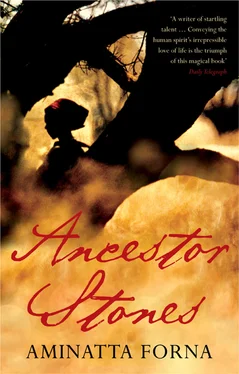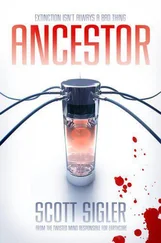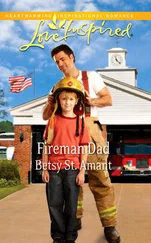Slowly the tension came alive, stirring in my belly like roiling eels. I got up to go. Bobbio grabbed my hand. It was nearly dark. Leaning over me Bobbio looked like his own shadow.
Bobbio is standing very close to me. His breathing is loud. I don’t know what he wants. He lets go of my left hand and takes up my right. Turns it over. Palms slide across one another. Something warm, heavy, drops. I am confused, it feels familiar. I squeeze my eyes closed. Feel the weight in my hand. A surface smooth as skin. One, two, three four five. I open my eyes. Strain to see in the nearly-night. There it is. Rippled like the sand on the windward side of a desert dune. A white, five-sided stone.
Now it is I who seizes Bobbio. ‘Where did you get it? Who gave it to you?’ I force him to look at me. I know he understands. He returns my hands to me, waves at me to sit down. Like a spectator at a masquerade I watch while Bobbio tells his story.
And here it is. Together with the little I knew for myself:
The Shekunas forced people to forsake the old gods, learn Arabic and pray in the new way. There were bonfires in every town and village. People were afraid. They carried their prayer mats to the fields, dropped to their knees and touched their noses to the ground every time a stranger approached.
In the first few months that followed the meeting my father became suddenly more devout. Yes, I remember that. I thought little of it. I thought little of anything in those days. Where before he left his wives to their own devotions, during that time he demanded their presence in the mosque every Friday. I wore a head veil and accompanied my mother. We sat at the back of the mosque among the other women. Ya Namina, she took to accompanying him there every day. So did the two youngest wives, keen to demonstrate their obedience.
Any activity Haidera said was haram , our father forbade. No more drinking palm wine in the village. Haram . Instead the old men sat out near the fields late at night passing the gourd from one to the other and wandered back towards the houses on unsteady legs at dawn. All matters connected with the old religion: charms, even the beads mothers hung around the waists of little children. Haram . Offerings of cakes and kola nuts at the graves of the dead. Haram . Dancing, drumming. Haram . The secret gatherings of women. Haram! Haram!
It was our usual habit, on those nights when it was our mother’s turn to be visited by our father, to sleep in the house of Ya Jeneba and Ya Sallay. For those three nights we shared mats with their children. It was during one of those times, while he wandered through the darkness, that Bobbio saw them.
A man striding. A woman pleading. Please. Please. Bobbio marches with matchstick straight legs and arms. Begs with a sideways bent body and clasped fingers. Points at me. Cradles an invisible baby in his arms. Your mother . My mother and my father. In the night. Your father is very angry . Hooded eyes, a rigid mouth. Now a sorrowful face. Your mother is crying . Bobbio follows them. At a distance. Ducking in and out of shadows. Down to the river.
I wish Bobbio could speak. I wonder what they are saying to each other. Bobbio stares at me silently. Your mother . Yes? My mother. Bobbio looks around. Points beyond the trees in the direction of the houses. Something about the village? Our house? No! No! Madam Bah’s shop! Now, I am certain. The snuff. Of course. My father found out about us making snuff. Not good, but not so very bad. I let the air out of my chest.
Bobbio shakes his head. Shoulders droop. For several moments we are silent, gazing at each other. My friend drops to his knees, mimes a person praying. The mosque. Praying in the mosque. Your mother . My mother is a Muslim? Shakes his head vigorously and waves a finger. Not . My mother is not a Muslim? Shakes his head despondently. Shrugs. Your mother is not a good Muslim .
That evening my father had interrupted my mother in her room, as she read her fortune in the stones. My mother never looked for trouble, perhaps that’s why she wasn’t more careful. She never believed trouble might look for her. But at that time my father was in the grip of a fever, determined to end all the superstitions that marked us out as half-hearted Muslims. He demanded her stones.
My mother pleaded. Crawling towards him, trying to touch his feet. I watched Bobbio grovel on the ground, holding illusory garments around imaginary breasts. Reaching out to touch invisible feet. O mama! I felt my heart pounding. My father stepped smartly back, refused to allow her to abase herself. Now Bobbio was up, chest out. He pulled her up. Bobbio grabbed me and held me against him. I felt myself go limp, just as my mother had. He threw up his arm. Scattered the stones to the stars.
Bobbio could see in the dark, almost. He noted where the stones had fallen. When my mother and father had gone he went closer, inspected the stones lying on the ground. Saw they were different to the ordinary river pebbles. He slipped back into the shadows. Left them there. That was all.
A dark rock the shape of a man’s cigar. A broken pebble, open like a split plum. A stone with a dimple that fitted my thumb. A twinkling crystal. A pale three-cornered stone. I won’t say I found them quickly. Not at all. Bobbio helped me. But even then, there were some I never found, whose faces I did not remember as well as I imagined.
The Ancestors, she called them. Her murmured chant, once engraved upon my brain, now suddenly was gone. The effort of remembering turned into a great rock. Then, when I finally abandoned the effort, the words appeared, like a sculpture carved out of sandstone. And now I recognise them for what they are.
Names.
The name of my mother’s mother. Of my grandmother. Of my great-grandmother and her mother. The women who went before. The women who made me. Each stone chosen and given in memory of a woman to her daughter. So that their spirits would be recalled each time the stone was held, warmed by a human hand, and cast on the ground to ask for help. And as the names emerged from the shadows, I saw how my father had destroyed my mother.
Mama returned. She stayed for a while. Then one day she left again. Danced on the outskirts of villages where superstitious villagers, thinking she was possessed by the spirit of some siren, left food out for her. Nearer the town they chased her away with sticks and stones. Once, twice, maybe three times, she returned, but the restlessness was too great. She could not stay. Each time Pa Foday brought her back. Eventually the time came when she went away for good.
As for Haidera Kontorfili, the authority of the Shekunas grew ever greater. He began to tell the world that the rule of the pothos was at an end. So the Europeans sent soldiers to arrest Haidera. The preacher swore he would never surrender. The Shekunas lay in wait on the opposite side of a bridge and killed the first man who tried to cross: a white man. Soon after, reinforcements arrived armed with guns.
Haidera was killed in battle, they said. The hyenas feasted on his body. The order went out: taxes to be collected and defaulters punished. But Haidera’s followers claimed their leader had used his magic powers to evade his captors. He had transformed himself into a deer and galloped away.
My life wasn’t supposed to be like this. But a lot of things happened to me that weren’t my fault. If things had been different, I could have been like you. Listen to what I am trying to tell you. The truth. The way it really was.
I never had luck. Not like other people. Yet I stand by and watch other people win all the time. Two days ago my neighbour came back with banknotes flapping out of his pocket, the new ones, not even the old ones. He had bought a lotto ticket and won. Later he came with soft drinks and beer for everybody in the compound. By the time I arrived there the others had already helped themselves. My own one was flat, but I drank it just to show willing.
Читать дальше












